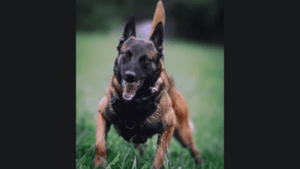Have you ever been awakened in the middle of the night by the sound of your dog whimpering in their sleep? You’re not alone. Many dog owners have experienced this phenomenon and have asked, “Why does my dog cry while sleeping?” This article will dive into this intriguing behavior, exploring everything from canine sleep cycles to dog sleep disorders and hopefully providing clarity on this puzzling canine behavior.
Dog Sleep Cycles and Canine Dreaming
Like humans, dogs have sleep cycles that include periods of deep sleep and REM (Rapid Eye Movement) sleep. During REM sleep, dogs, like people, dream. If you’ve ever noticed your dog twitching, moving its paws, or even barking softly while sleeping, they’re likely in the REM stage of sleep and might be having a dream.
But do dogs have bad dreams? The answer is possible. While we can’t exactly ask our dogs about their goals, the behaviors exhibited during their sleep, such as whimpering, crying, or twitching, can be indicative of a dream – or, sometimes, a nightmare.
Signs of Dog Nightmares
- Whining or crying in sleep
- Twitching or involuntary movements
- Rapid breathing or panting
- Sudden awakening with signs of fear or confusion

Night Time Dog Crying: Possible Causes and Interpretations
It can be distressing to witness if your dog cries during sleep, but it doesn’t always indicate something negative. It’s essential to differentiate between occasional whimpering and persistent or distressing crying that may signal an underlying issue.
Dog Sleep Disorders
Just like humans, dogs can also experience sleep disorders that might cause them to cry during their sleep. Some conditions, such as REM sleep behavior disorder or narcolepsy, can cause unusual vocalizations or movements during sleep.
Night Anxiety in Dogs
Sometimes, dogs might cry at night due to anxiety or stress. This is particularly true for rescue dogs or those with traumatic backgrounds. If the crying is accompanied by signs of fear when awake, such as restlessness or destructive behavior, it might be worth consulting a vet or a dog behaviorist.
Physical Discomfort
If your dog cries while sleeping and appears uncomfortable when awake, it may be experiencing physical discomfort or pain. Look for signs of distress when your dog is moving or symptoms of injury on their body. If you suspect your dog is in pain, consult a vet immediately.

Dog's Sleep vs Human's Sleep: A Comparative Analysis
The way dogs sleep and the reasons behind their sleep behaviors can sometimes be better understood when compared to human sleep patterns. Canine sleep health varies significantly from humans, mainly due to differing sleep-wake cycles and the amount of sleep required.
Dogs have a more flexible sleep pattern than humans. While humans have a monophasic sleep pattern (one sleep period over 24 hours), dogs have a polyphasic sleep pattern, meaning they sleep multiple times throughout the day and night.
Moreover, the REM cycle, where most dreaming and associated behaviors like crying happen, is much shorter for dogs. This means they transition faster into this dream-filled phase of sleep, which might contribute to more frequent expressions of sleep noises, including whimpering or crying.
How to Comfort a Crying Dog During Sleep
Hearing your dog cry while sleeping can be distressing, but there are several things you can do to provide comfort.
Create a Comfortable Sleeping Environment
Ensuring your dog has a quiet, cozy, and safe space to sleep can significantly affect their sleep quality. A comfortable bed in your house’s warm, dark, and quiet area can provide an optimal environment for peaceful sleep.
Maintain a Regular Schedule
Consistency in feeding, exercise, and bedtime routines can greatly benefit your dog’s sleep quality. Dogs thrive on performance, and an irregular schedule can contribute to stress or anxiety, potentially leading to disrupted sleep and crying.
Gentle Reassurance
If your dog wakes up crying from a dream, gentle reassurance can help. Speak softly and pet them gently to provide comfort. However, avoid waking them up abruptly from sleep as it might cause confusion or stress.
When to Seek Veterinary Help?
If your dog’s crying during sleep becomes more frequent and louder or is accompanied by other distressing symptoms such as limping, loss of appetite, or changes in behavior, it’s advisable to consult a vet. They can rule out any underlying health issues like sleep disorders or pain that may be causing the crying.
Understanding Dog Sleep Sounds: Beyond Crying
Dogs make various sounds while sleeping, from barks and growls to whines and whimpers. These are often just responses to their dreams and don’t cause concern. Recognizing these sounds and their meaning can help you better understand your dog’s sleep behaviors and comfort them when needed.
As we conclude this article, remember that dogs normally cry while sleeping. It’s part of their dreaming process and often isn’t a cause for concern. However, being aware of your dog’s sleep patterns, behaviors, and overall health can ensure they’re comfortable and healthy, even in the world of dreams.

Final Thoughts
In conclusion, if you’re wondering, “Why does my dog cry while sleeping?” remember that it’s usually a normal part of their dreaming process. However, frequent or distressing crying could signal that your dog is uncomfortable or experiencing health issues. Always observe their behavior, ensure they’re comfortable, and don’t hesitate to consult a vet if you’re concerned.
Dog owners are often familiar with their pets’ behaviors and will know when something isn’t quite right. By staying informed and understanding the nuances of canine sleep, you can ensure your furry friend enjoys peaceful, dream-filled slumbers. Even in dreamland, we can provide for our companions’ well-being with proper attention, care, and much love.
FAQ: Addressing Your Concerns about "Why Does My Dog Cry While Sleeping"
Can Dogs Have Nightmares?
Yes, dogs can have nightmares, much like humans. It’s believed that they dream about their daily experiences, and just as those experiences can be frightening or stressful, so can their dreams. This may lead to crying or whimpering during sleep.
How Can I Tell If My Dog Is Having a Nightmare?
While there’s no definitive way to tell if a dog is having a nightmare, certain signs might suggest discomfort or distress. These include crying, whimpering, growling, twitching, or even running movements during sleep.
Should I Wake My Dog If They Cry in Their Sleep?
Walking a dog from sleep is not recommended, as this can lead to disorientation or anxiety. However, if your dog seems particularly distressed, you might want to gently wake them up by softly calling their name or lightly petting them.
How Can I Prevent My Dog from Having Nightmares?
While we can’t entirely prevent dogs from having nightmares, ensuring they have positive daily experiences can help. Regular exercise, plenty of playtime, and a stress-free environment can improve sleep quality.
My Dog Cries While Sleeping. Should I Be Worried?
While occasional crying during sleep is normal for dogs, frequent or intense crying could indicate an underlying problem. If you’re concerned, it’s always best to consult a vet to rule out any health issues.
Related Articles

Do Dogs Heal Faster Than Humans? The Surprise Facts Revealed
Regarding the question, “Do dogs heal

Uncover your dog breed based on your zodiac sign
Were you looking for the perfect

Why are brindle dogs unpopular?
Why are brindle dogs unpopular? Brindle

My dog will only eat human food: 9 Frequently Asked Questions
My dog will only eat human

The Best Dog Breeds for Families: A Guide to Choosing the Perfect Companion
The best dog breeds for families:

Discover the Top 10 Police Dog Breeds Used Worldwide
Discover the top 10 police dog

